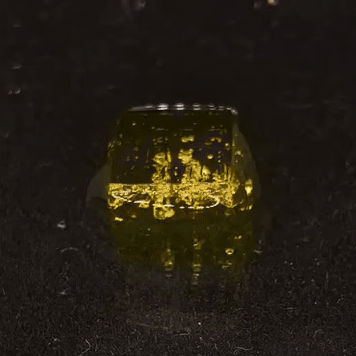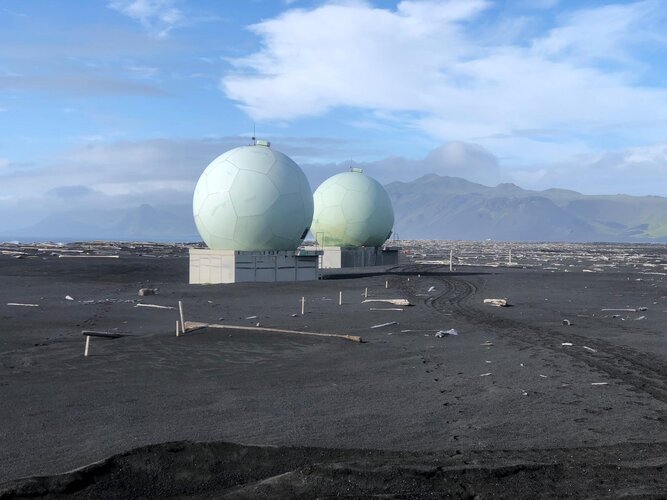Blue Origin mission simulates moon gravity
Thursday, 06 February 2025 09:37 Blue Origin's New Shepard rocket and spacecraft completed its moon-gravity mission, but the capsule appeared to have a slight hiccup on its return when one of its parachutes did not open entirely on Tuesday.
NS-29 took off from Blue Origin Launch One site in Culberson County, Texas, near El Paso, at about 11 a.m. on Tuesday. The reusable booster rocket made a vertical touchdown on a lau
Blue Origin's New Shepard rocket and spacecraft completed its moon-gravity mission, but the capsule appeared to have a slight hiccup on its return when one of its parachutes did not open entirely on Tuesday.
NS-29 took off from Blue Origin Launch One site in Culberson County, Texas, near El Paso, at about 11 a.m. on Tuesday. The reusable booster rocket made a vertical touchdown on a lau Alloy discovered that barely changes with temperature
Thursday, 06 February 2025 09:37 Most metals tend to lengthen as temperatures climb. The Eiffel Tower, for instance, can stand roughly 10 to 15 centimeters taller in summer than in winter because of this thermal expansion. While such elongation is a normal phenomenon in metals, it poses challenges in precision applications, prompting researchers to look for substances that remain dimensionally stable under heat. One well-known
Most metals tend to lengthen as temperatures climb. The Eiffel Tower, for instance, can stand roughly 10 to 15 centimeters taller in summer than in winter because of this thermal expansion. While such elongation is a normal phenomenon in metals, it poses challenges in precision applications, prompting researchers to look for substances that remain dimensionally stable under heat. One well-known Filipino researchers identify Taal ash as new radiation shield
Thursday, 06 February 2025 09:37 Researchers affiliated with the Ateneo de Manila University and National University- Mall of Asia Campus have revealed a unique application for the large volumes of volcanic ash that blanketed parts of the Philippines. Their investigation shows that Taal volcanic ash (TVA) can effectively serve as a barrier against ionizing radiation, potentially providing more sustainable shielding in industrie
Researchers affiliated with the Ateneo de Manila University and National University- Mall of Asia Campus have revealed a unique application for the large volumes of volcanic ash that blanketed parts of the Philippines. Their investigation shows that Taal volcanic ash (TVA) can effectively serve as a barrier against ionizing radiation, potentially providing more sustainable shielding in industrie Novel high-heat lubricant drastically reduces friction
Thursday, 06 February 2025 09:37 In a joint effort spanning multiple universities, researchers at Virginia Tech have identified a new solid lubricating strategy that can significantly reduce friction in high-temperature machinery. Performing well beyond the thermal limits where traditional options like graphite fail, this technology was featured in Nature Communications.
"This breakthrough solid-state lubricant could chan
In a joint effort spanning multiple universities, researchers at Virginia Tech have identified a new solid lubricating strategy that can significantly reduce friction in high-temperature machinery. Performing well beyond the thermal limits where traditional options like graphite fail, this technology was featured in Nature Communications.
"This breakthrough solid-state lubricant could chan Sidus Space moves LizzieSat-3 to Vandenberg for upcoming orbit mission
Thursday, 06 February 2025 09:37 Sidus Space (NASDAQ: SIDU) (the "Company" or "Sidus"), known for its innovative and agile space mission services, has confirmed that LizzieSat(TM)-3 has arrived at Vandenberg Space Force Base in California. The spacecraft will now undergo integration in advance of its planned deployment into low Earth orbit no earlier than the first quarter of 2025, as part of SpaceX's Transporter-13 rideshare m
Sidus Space (NASDAQ: SIDU) (the "Company" or "Sidus"), known for its innovative and agile space mission services, has confirmed that LizzieSat(TM)-3 has arrived at Vandenberg Space Force Base in California. The spacecraft will now undergo integration in advance of its planned deployment into low Earth orbit no earlier than the first quarter of 2025, as part of SpaceX's Transporter-13 rideshare m BlackSky secures multiyear EMDYN contract to enhance global on demand satellite imagery
Thursday, 06 February 2025 09:37 BlackSky Technology Inc. (NYSE: BKSY) has signed a multi-year contract with geospatial intelligence fusion specialist EMDYN (Emerging Dynamics) to provide satellite imagery services for defense clients around the world. This agreement enables international defense agencies to implement automated tip-and-cue tasking through APIs and combine signals intelligence with other data sources to support
BlackSky Technology Inc. (NYSE: BKSY) has signed a multi-year contract with geospatial intelligence fusion specialist EMDYN (Emerging Dynamics) to provide satellite imagery services for defense clients around the world. This agreement enables international defense agencies to implement automated tip-and-cue tasking through APIs and combine signals intelligence with other data sources to support Kayhan Space Debuts Unified Satcat Suite for Industry Wide Spaceflight Intelligence
Thursday, 06 February 2025 09:37 Kayhan Space, a provider of modern spaceflight and safety solutions, has announced the official rollout of its expanded Satcat Product Suite. This major enhancement of its space intelligence exchange platform merges the core capabilities of Satcat, a premier data hub, with Pathfinder, an advanced suite of spaceflight tools, into a single integrated offering.
It unifies the industry's most
Kayhan Space, a provider of modern spaceflight and safety solutions, has announced the official rollout of its expanded Satcat Product Suite. This major enhancement of its space intelligence exchange platform merges the core capabilities of Satcat, a premier data hub, with Pathfinder, an advanced suite of spaceflight tools, into a single integrated offering.
It unifies the industry's most Mobix Labs Secures Defense Funding to Advance SATCOM SoC Innovation
Thursday, 06 February 2025 09:37 Mobix Labs Inc. (Nasdaq: MOBX), recognized for cutting-edge Wireless technology and semiconductor expertise, reports that its newly integrated RaGE Systems Inc. (CAGE:863W3) has been selected for a Phase 1 Small Business Technology Transfer (STTR) award.
This grant, provided by the U.S. Department of Defense's Defense Microelectronics Activity (DMEA), supports initial work with the Univers
Mobix Labs Inc. (Nasdaq: MOBX), recognized for cutting-edge Wireless technology and semiconductor expertise, reports that its newly integrated RaGE Systems Inc. (CAGE:863W3) has been selected for a Phase 1 Small Business Technology Transfer (STTR) award.
This grant, provided by the U.S. Department of Defense's Defense Microelectronics Activity (DMEA), supports initial work with the Univers ATLAS bolsters radio frequency network through new HawkEye 360 alliance
Thursday, 06 February 2025 09:37 ATLAS Space Operations(R) has formed a strategic alliance with HawkEye 360, a leader in space-based radio frequency (RF) data and analytics. This partnership incorporates ATLAS' ground stations in Mingenew, Australia and Awarua, New Zealand into HawkEye 360's global network, further strengthening the company's RF monitoring initiatives.
"Integrating the ATLAS ground stations in Mingenew an
ATLAS Space Operations(R) has formed a strategic alliance with HawkEye 360, a leader in space-based radio frequency (RF) data and analytics. This partnership incorporates ATLAS' ground stations in Mingenew, Australia and Awarua, New Zealand into HawkEye 360's global network, further strengthening the company's RF monitoring initiatives.
"Integrating the ATLAS ground stations in Mingenew an Finland and ESA join forces to establish groundbreaking Earth observation supersite
Thursday, 06 February 2025 09:37 In a milestone move, the European Space Agency (ESA), Finland's government, and the Finnish Meteorological Institute have begun laying the groundwork for a new Earth observation calibration and validation supersite in Sodankyla, Lapland. This collaborative endeavor promises wide-ranging benefits for Europe's space community.
Developed as a shared initiative, this facility will bolster ESA'
In a milestone move, the European Space Agency (ESA), Finland's government, and the Finnish Meteorological Institute have begun laying the groundwork for a new Earth observation calibration and validation supersite in Sodankyla, Lapland. This collaborative endeavor promises wide-ranging benefits for Europe's space community.
Developed as a shared initiative, this facility will bolster ESA' SpaceX launches Maxar 3 mission, high-resolution commercial satellites
Thursday, 06 February 2025 09:37 SpaceX launched its Maxar 3 mission, with two high-resolution commercial satellites on board, from the Kennedy Space Center in Florida on Tuesday after Monday's launch was scrubbed.
The Maxar 3 mission, which carried both WorldView Legion satellites into mid-inclination Earth orbit, lifted off from Launch Complex 39A at about 6:13 p.m. EST.
"SpaceX has confirmed that it is now se
SpaceX launched its Maxar 3 mission, with two high-resolution commercial satellites on board, from the Kennedy Space Center in Florida on Tuesday after Monday's launch was scrubbed.
The Maxar 3 mission, which carried both WorldView Legion satellites into mid-inclination Earth orbit, lifted off from Launch Complex 39A at about 6:13 p.m. EST.
"SpaceX has confirmed that it is now se Can ocean-floor mining oversights help us regulate space debris and mining on the Moon?
Thursday, 06 February 2025 09:37 Mining ocean resources needed for electric cars and other devices is currently a hot issue of dispute. Final resolution of how or whether the seabed should be exploited is pending. Outcomes in this contentious area could create precedents that could impact decisions about mining the moon.
These precedents might shape the how and why of mining the Moon and shape the future and the sustainab
Mining ocean resources needed for electric cars and other devices is currently a hot issue of dispute. Final resolution of how or whether the seabed should be exploited is pending. Outcomes in this contentious area could create precedents that could impact decisions about mining the moon.
These precedents might shape the how and why of mining the Moon and shape the future and the sustainab For astronaut radiation protection, just add water
Thursday, 06 February 2025 08:35
Space is not the safest place to be. During spaceflight, both devices and humans risk exposure to high levels of radiation. Without sufficient protection, instruments would malfunction, and astronauts might face serious health risks. A team of researchers from Ghent University in Belgium are testing the potential of 3D-printed hydrogels – materials that can soak up large amounts of water – to serve as highly-effective radiation shields.
XMM-Newton finds two stray supernova remnants
Thursday, 06 February 2025 08:30 Image:
XMM-Newton finds two stray supernova remnants
Image:
XMM-Newton finds two stray supernova remnants Galileo sites from pole to tropics begin migration
Wednesday, 05 February 2025 13:24
In a landmark achievement, ESA successfully migrated Galileo’s Control Centres in a highly complex operation involving over 200 people from the Agency, industry and EUSPA. This milestone marked the beginning of a global operation to upgrade Galileo’s entire Ground Segment, a vast network of stations spread around the world.

